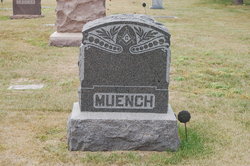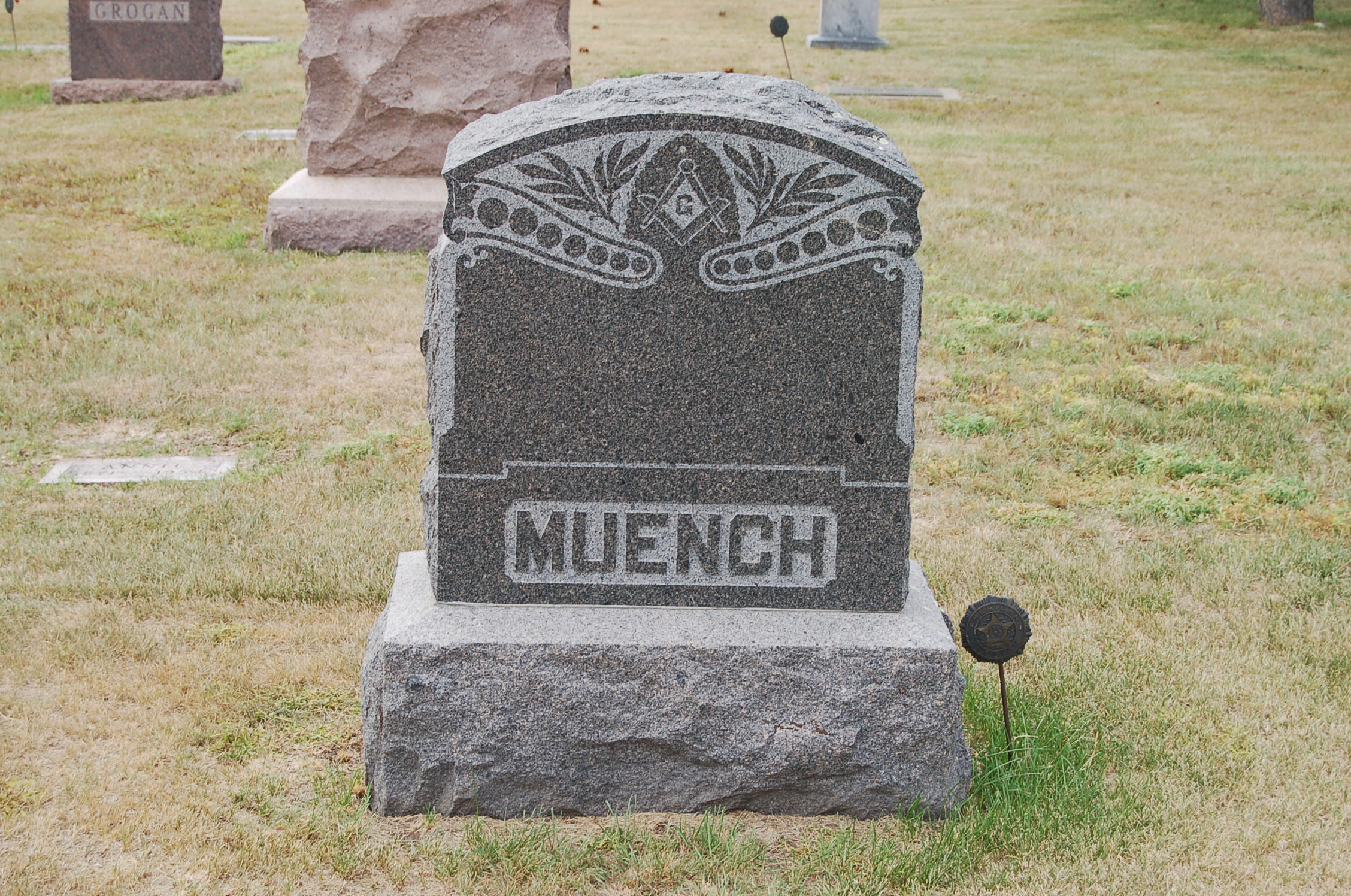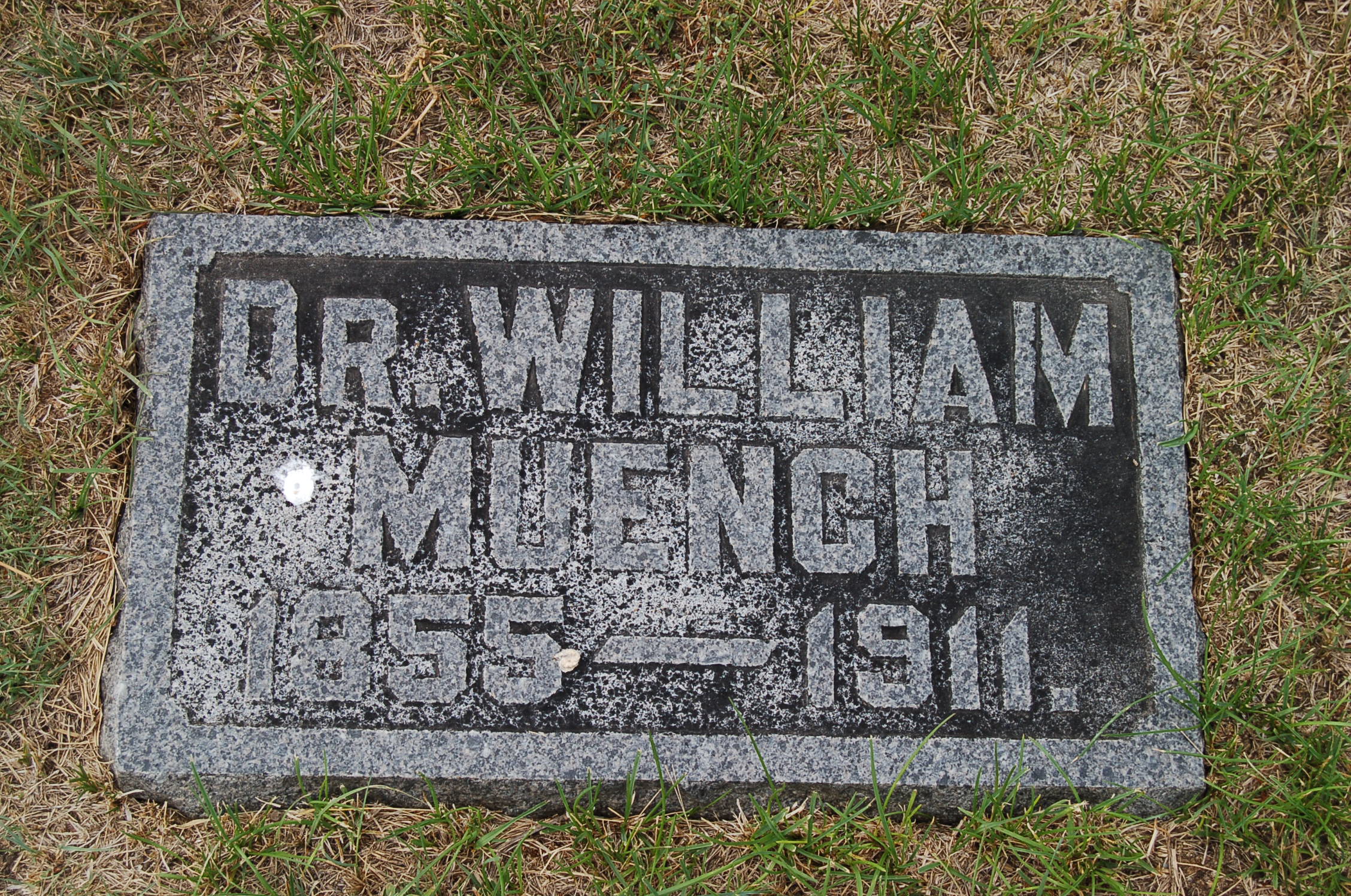The Death Angel has again visited Linton. Dr. Muench is dead.
Last Monday, in company with a neighbor, he walked home at noon, apparently in health no worse than had been his for a long time. After reaching home he laid down on a lounge, picked up a magazine and began to read. Suddenly the book dropped from his hand and he passed away without a struggle or apparent pain.
The funeral took place yesterday afternoon, being in charge of the Linton lodge of the Masonic order, of which deceased was a charter member and secretary. The remains were interred in Linton cemetery.
The funeral services took place at the home of the family. At the request of deceased some time before his death, Mr. Chas. S. Lane, a brother Freemason, made some appropriate remarks. A long line of vehicles followed the remains to the tomb, where they were consigned to the grave with the impressive Masonic ceremonies for the dead, the Masons walking in procession to the cemetery. AT the close of the ceremonies Dr. Smith sounded taps over the grave, also in response to a request which had been made by deceased.
The deceased was born in Etherfeld, near Cologne, Rhenish Prussia, German, March 5, 1855, and ws therefore a few months more than fifty-six years of age at the time of his death.
He remained at home with his parents in Germany until he was about twenty-two years of age, and then, like so many ambitious young men among his countrymen, he took passage across the ocean for that land of the west where, on account of its youth, there were better opportunities than there were in the Old World.
In May, 1886, he was married at San Antonio, Texas, to Miss Eliza W. Gardner, who survives him. To this union were born two children – a son and a daughter, Otto Walter and Marie.
Dr. Muench served in the regular army for a continuous period of seventeen years. His regiment was the Seventeenth Infantry. In 1885, after an examination as to qualifications he was made hospital steward of the first class, and held that position seven years, until retirement from the army.
For eighteen years he had been a resident of Emmons county. When he settled here, and for many years thereafter, no regular physician had yet made this county his home. Well educated, intelligent and a student, and with his many years of practical experience in hospital work, it was not long after he settled on his claim down in that garden spot of the county near where Beaver creek empties into the Missouri that the settlers began to send for him in sickness and accidents, or to visit him when their ailments were of a less serious nature. It was in vain that he told them that he was not a regular doctor and that he would much rather they would get a practicing physician from Bismarck or Eureka, for, they had come to have faith in him and insisted on having his services. And although sometime objecting, he was too kind hearted to refuse the call of sickness, regardless of the question of payment, and for years a large part of the medical practice of the county was performed by him. When regular physicians settled in the county, Dr. Muench refused to practice longer, but he was frequently called to aid when a serious operation was to be performed.
Dr. Muench saw service in the army during a period when the Indians were warlike, and when some of the tribes were powerful. Army service in those days demanded that the soldiers suffer severe hardships. Campaigning and doing post duty in the unsettled New Northwest were almost equally hazardous, and while stationed at Fort Totten one cold winter Dr. Muench was badly frozen.
For many years Dr. Muench lived on his Emmonsburg farm. A few years ago, however, his health not being good and his years and hard service in the army beginning to tell, he and his family came to Linton and made their residence. A year or so ago he was appointed by Judge Amiden to the position of United States Court Commissioner and held the position at the time of his death. He had been ailing with heart trouble many years.
The deceased pioneer was universally respected throughout the county. He was a man of earnest views and beliefs and was never backward in advocating what he believed, regardless of whether his view was popular or otherwise. Frequently the writher has heard someone say, “Well, I don’t agree with Dr. Muench on certain questions, but everybody must respect his honesty of belief and action.”
It is not surprising then, dear reader, that the death of this old soldier and early settler has caused a feeling of profound sorrow among not only those who had known him many years and experienced with him the hardship and discomforts of the early days, but among the people of more recent settlement who had associated with the doctor since his coming to Linton to reside. And the sympathy extended to the loyal helpmate of his manhood life, and to his son and daughter, is of the heart rather than of the lips.
The Emmons County Record, August 17, 1911, Page 3.
The Death Angel has again visited Linton. Dr. Muench is dead.
Last Monday, in company with a neighbor, he walked home at noon, apparently in health no worse than had been his for a long time. After reaching home he laid down on a lounge, picked up a magazine and began to read. Suddenly the book dropped from his hand and he passed away without a struggle or apparent pain.
The funeral took place yesterday afternoon, being in charge of the Linton lodge of the Masonic order, of which deceased was a charter member and secretary. The remains were interred in Linton cemetery.
The funeral services took place at the home of the family. At the request of deceased some time before his death, Mr. Chas. S. Lane, a brother Freemason, made some appropriate remarks. A long line of vehicles followed the remains to the tomb, where they were consigned to the grave with the impressive Masonic ceremonies for the dead, the Masons walking in procession to the cemetery. AT the close of the ceremonies Dr. Smith sounded taps over the grave, also in response to a request which had been made by deceased.
The deceased was born in Etherfeld, near Cologne, Rhenish Prussia, German, March 5, 1855, and ws therefore a few months more than fifty-six years of age at the time of his death.
He remained at home with his parents in Germany until he was about twenty-two years of age, and then, like so many ambitious young men among his countrymen, he took passage across the ocean for that land of the west where, on account of its youth, there were better opportunities than there were in the Old World.
In May, 1886, he was married at San Antonio, Texas, to Miss Eliza W. Gardner, who survives him. To this union were born two children – a son and a daughter, Otto Walter and Marie.
Dr. Muench served in the regular army for a continuous period of seventeen years. His regiment was the Seventeenth Infantry. In 1885, after an examination as to qualifications he was made hospital steward of the first class, and held that position seven years, until retirement from the army.
For eighteen years he had been a resident of Emmons county. When he settled here, and for many years thereafter, no regular physician had yet made this county his home. Well educated, intelligent and a student, and with his many years of practical experience in hospital work, it was not long after he settled on his claim down in that garden spot of the county near where Beaver creek empties into the Missouri that the settlers began to send for him in sickness and accidents, or to visit him when their ailments were of a less serious nature. It was in vain that he told them that he was not a regular doctor and that he would much rather they would get a practicing physician from Bismarck or Eureka, for, they had come to have faith in him and insisted on having his services. And although sometime objecting, he was too kind hearted to refuse the call of sickness, regardless of the question of payment, and for years a large part of the medical practice of the county was performed by him. When regular physicians settled in the county, Dr. Muench refused to practice longer, but he was frequently called to aid when a serious operation was to be performed.
Dr. Muench saw service in the army during a period when the Indians were warlike, and when some of the tribes were powerful. Army service in those days demanded that the soldiers suffer severe hardships. Campaigning and doing post duty in the unsettled New Northwest were almost equally hazardous, and while stationed at Fort Totten one cold winter Dr. Muench was badly frozen.
For many years Dr. Muench lived on his Emmonsburg farm. A few years ago, however, his health not being good and his years and hard service in the army beginning to tell, he and his family came to Linton and made their residence. A year or so ago he was appointed by Judge Amiden to the position of United States Court Commissioner and held the position at the time of his death. He had been ailing with heart trouble many years.
The deceased pioneer was universally respected throughout the county. He was a man of earnest views and beliefs and was never backward in advocating what he believed, regardless of whether his view was popular or otherwise. Frequently the writher has heard someone say, “Well, I don’t agree with Dr. Muench on certain questions, but everybody must respect his honesty of belief and action.”
It is not surprising then, dear reader, that the death of this old soldier and early settler has caused a feeling of profound sorrow among not only those who had known him many years and experienced with him the hardship and discomforts of the early days, but among the people of more recent settlement who had associated with the doctor since his coming to Linton to reside. And the sympathy extended to the loyal helpmate of his manhood life, and to his son and daughter, is of the heart rather than of the lips.
The Emmons County Record, August 17, 1911, Page 3.
Family Members
Sponsored by Ancestry
Advertisement
Records on Ancestry
Advertisement








